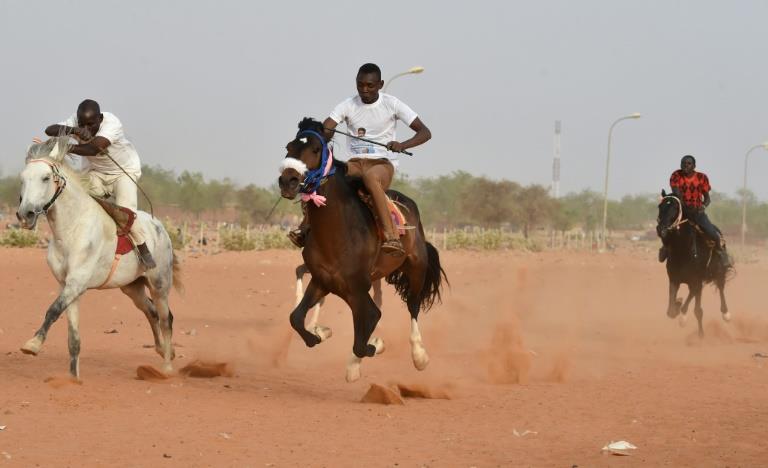
Niger's legacy of legendary horses lives on
But the legacy of Niger's most famous stallion Dokin Iska Dan Filingue that raced in front of Queen Elizabeth II in 1956 lives on in a neglected corner of the country's capital.
Though formal meets ended 30 years ago, hundreds of young Nigeriens gather at weekends to witness the improvised races.
In the shadow of a giant advertising board for the country's now defunct lottery, proclaiming "Fortune for the winners, benefits for the Nation", professional jockeys, trainers and bookmakers all jostle to make money and entertain the crowds.
And despite barely visible track markings, the country's small racing scene hopes that the nation's past glories can be revived with the construction of a new horse racing complex.
- 'An unbeatable horse' -
Niger's love affair with all things equine is largely down to the global success of Dokin Iska Dan Filingue whose name in Hausa means 'the horse of the wind from Filingue (a town in the country)'.
"It was an unbeatable horse," said Abdoulaye Mohamed, head of the Nigerien horse racing federation (Feniseq) while surveying the track from a folding chair with a pair of binoculars.
Filingué was immortalised in a song by the celebrated Hausa singer and storyteller Ibrahim Narambada who died in 1960 which proclaims that the horse, an Arewa native to Niger, won at every race course in the country.
At the height of his racing prowess, Filingue enjoyed international acclaim after a memorable victory in front of Queen Elizabeth II who was in Nigeria on a state visit.
"It was even said that the horse was then sent to England where he again won all his races. But that wasn't true. That was gossip ... the horse was sent back to Niger. In his twilight years they built an enclosure for him here so that people could come and visit him," said Mohamed.
- 'Here we have nothing' -
Though the horses that compete on the sandy track in the Saturday afternoon races are a far cry from their famous forebears, crowds of several hundred faithfully turn out to witness the jockeys and their steeds compete.
One of the jockeys, Soulemane Ali, 46-years-old and 1.64 metres tall, wraps black tape on a wooden stick to double as a crop as he prepares to race.
Dressed in plastic boots -- which he stuffs with coloured fabric -- and jeans but no helmet, Ali, known to the crowds as 'Papa Jockey', blamed crippling poverty in the country for his improvised racing attire.
"I'm poor, just like everything here. We see the races in Europe on TV, they have everything. Here we have nothing. That makes me want to run there," he said.
As many as 20 jockeys take part in Niamey's racing scene, with most entirely dependent on their results to secure a living.
After each race the jockeys coming in first or second place are given envelopes containing 20,000-40,000 Central African Francs (30 to 60 euros) depending on the value of the bets placed.
Some of the jockeys have the opportunity to work directly for a breeder and receive a monthly salary of as much as 300,000 CFA francs (460 euros), a significant amount in a country where more than three quarters of people live on less than $2 a day.
"Rivalries are strong. We sometimes elbow each other," admitted Papa Jockey.
But those not fortunate enough to be paid a salary sometimes struggle to make ends meet.
"They don't get pensions. They race until they can't do it anymore," said Alio Daouda, a magistrate who also works as a breeder.
Daouda, who is also a member of the Féniseq federation, has an ambitious vision for reviving the country's dormant horse racing sector.
He is seeking investors to fund a major overhaul of Niger's racing scene.
"We have the space, we could build a hotel, a conference centre. All of the races could be organised, it could be institutionalised and jobs could be created. But here, everything is deserted," said Daouda.
- Lucky orange tasselled cap -
Back on the track, the races continued. Eight horses surged past kicking up a cloud of orange dust prompting huge cheers from the assembled crowd.
The race was won by Noura Idi, recognisable in the distance from his lucky orange tasselled cap.
The day's meetings were fruitful for him, having finished second in the first race of the day and winning the last contest.
"Sometimes you have to hold him to keep it going to the end. I started with my father when I was young. As I was winning a lot of races in the countryside, I was made to come to Niamey," said Idi, who unlike the other jockeys wears authentic riding boots, albeit with a loose heel.
And according to leading lights in the local racing world, the key to racing success in Niger may not simply rest with horse and rider.
One respected former jockey who notably rode in Nigeria, said the secret to victory was to find and sacrifice a red goat.
"I found one and I won!" remembered Souleymane Mamane.

Legal Disclaimer:
MENAFN provides the
information “as is” without warranty of any kind. We do not accept
any responsibility or liability for the accuracy, content, images,
videos, licenses, completeness, legality, or reliability of the information
contained in this article. If you have any complaints or copyright
issues related to this article, kindly contact the provider above.
















Comments
No comment